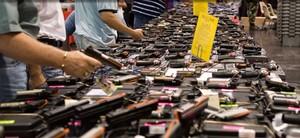GunsBackground checks should be required for all firearm transfers: study
In 2012, there were an estimated 467,321 firearm-related violent crimes in the United States, a 26 percent increase since 2008. There were 11,101 firearm homicides that year, and an estimated 55,544 injuries resulting from gun-related assaults requiring treatment in hospital emergency departments. Individuals who buy firearms from a license dealer must undergo a background check, but 40 percent of U.S. gun transactions are exempt from background checks because they occur between unlicensed private parties, such as people buying and selling at gun shows. That figure doubles, to more than 80 percent, for firearm sales that involve criminal intent.

Gun shows account for 40% of firearms transfers // Source: jhsph.edu
Gun violence in the United States can be substantially reduced if Congress expands requirements for background checks on retail gun sales to cover firearm transfers between private parties, a new report by the director of the University of Californiaq, Davis Violence Prevention Research Program concludes. The report, Background Checks for Firearm Transfers, by Garen Wintemute, who also serves as a professor of emergency medicine, notes that 40 percent of U.S. gun transactions occur between unlicensed private parties, such as people buying and selling at gun shows. That figure doubles, to more than 80 percent, for firearm sales that involve criminal intent.
A UC Davis release reports that private-party transactions make up an often overlooked, thriving secondary gun market that is exempt from background checks and other controls designed to keep firearms out of the hands of criminals and others prohibited from legally purchasing a gun.
By creating a single, equitable structure governing all retail commerce in firearms, Congress could make it harder for criminals to obtain guns, substantially reduce firearm-related violence, and curb the large-volume gun purchases that result in firearm trafficking, Wintemute said.
The report comes on the heels of the Newtown, Connecticut, massacre, in which twenty children and six adults were shot at Sandy Hook Elementary School. Since that December tragedy, President Obama has made gun violence a top priority and is pushing lawmakers to tighten gun laws and take other steps to reduce future violence.
While shootings such as the Newtown episode intensify public concern, statistics show gun violence is an everyday, serious threat to the nation’s health and safety. In 2012, there were an estimated 467,321 firearm-related violent crimes in the United States, a 26 percent increase since 2008. There were 11,101 firearm homicides that year, and an estimated 55,544 injuries resulting from gun-related assaults requiring treatment in hospital emergency departments.
The release notes that Wintemute’s study provides an in-depth look at procedures governing gun purchases and the double standard that distinguishes rules for retail sales from those covering private-party transactions.
A buyer at a retail establishment, for example, must complete a lengthy Firearms Transaction Record and certify that he is buying the gun for himself and is not a member of any of the prohibited groups as defined by federal statute. The retailer must then submit the buyer’s identifying information to the FBI to check for a criminal history and verify the buyer’s eligibility to purchase firearms,
